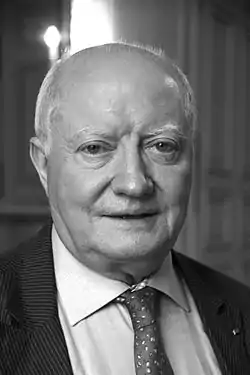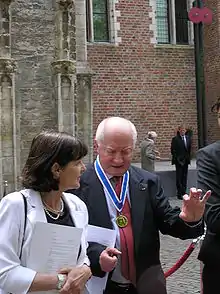Jean-Paul Costa
Jean-Paul Costa (born 3 November 1941)[1] is a French jurist and was the President of the European Court of Human Rights from 19 January 2007 until his term at the Court ended on 3 November 2011.[1][2] He was first appointed a judge of the Court on 1 November 1998, and in 2009 was elected to serve an additional three years as President.[3]
Jean-Paul Costa | |
|---|---|
 Jean-Paul Costa, May 2013 | |
| President of the European Court of Human Rights | |
| In office 19 January 2007 – 3 November 2011 | |
| Vice President | Christos Rozakis Sir Nicolas Bratza |
| Preceded by | Luzius Wildhaber |
| Succeeded by | Sir Nicolas Bratza |
| Personal details | |
| Born | 3 November 1941 Tunis, Tunisia |
| Nationality | French |
| Residence | Strasbourg |
| Education | Lycée Henri-IV |
| Alma mater | Sciences Po, ÉNA |
| Profession | Lawyer |
| Website | www.echr.coe.int |
Early life
Costa was born in Tunis, capital of Tunisia, and educated at the Lycée Carnot in the city, but his family left when the country declared independence in 1957. He was then educated at the prestigious Lycée Henri-IV in Paris, before studying at the Institut d'Études Politiques de Paris, better known as Sciences Po, graduating with an undergraduate diploma in 1961, Master of Laws in 1962 and Diploma of Superior Studies in Public Law in 1964. He then studied from 1964 to 1966 at the École nationale d'administration (National Management School).
Career

In June 1966, Costa was appointed Auditeur in the Council of State, a body of the French national government that provides the executive branch with legal advice and acts as the administrative court of last resort. From 1968 to 1973, he lectured at Sciences Po, and from 1981 to 1984 was Director of the Office of the Minister of National Education, Alain Savary. From 1985 to 1986, he led the French delegation negotiating construction of the Channel Tunnel, and from 1985 to 1989 taught at the International Institute of Public Administration. He was then appointed Visiting Professor at the University of Orléans (1989-1998) and the Sorbonne (1992-1998). After end of his function as President of European Court of Human Rights, he is appointed the president of International Institute of Human Rights.
European Court of Human Rights
On 1 January, he was appointed the judge in respect of France at the newly-permanent European Court of Human Rights On 1 May 2000, he rose to become a Section President and on 1 November 2001 Vice-President of the Court.[4] On 19 January 2007, he succeeded Swiss Luzius Wildhaber as President of the Court. He was re-elected to this post in 2009. His function as President ended on 3 November 2011. He was succeeded by Sir Nicolas Bratza.
References
- "Curriculum vitae". Echr.coe.int. Retrieved 28 January 2012.
- "Procedure for electing judges to the European Court of Human Rights" (PDF). Committee on Legal Affairs and Human Rights, Parliamentary Assembly of the Council of Europe. 9 February 2011. p. 7. Retrieved 19 February 2011.
- "Elections At The European Court Of Human Rights". Cmiskp.echr.coe.int. Retrieved 28 January 2012.
- As Vice President, in a written intervention (read by Sabino Cassese) at the seminar The principles of European administrative law, held at the Institute of Public Law of the University "La Sapienza" of Rome, on 15 April 2002, explained to which conditions State interference in rights and freedoms may be considered compatible with the European Convention of Human Rights: Buonomo, Giampiero (2004). "L'insindacabilità (in Italia) delle espressioni diffamatorie apre le porte alla violazione della Convenzione". Diritto&Giustizia edizione online. – via Questia (subscription required)